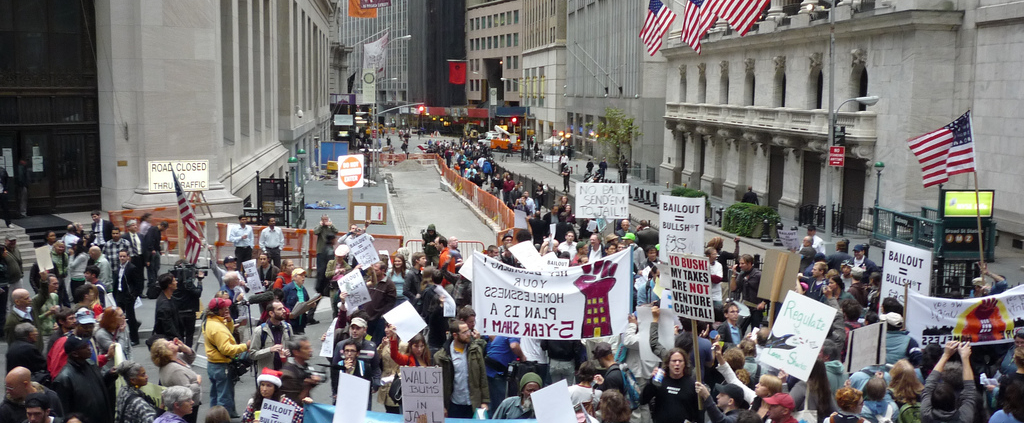The Great Shakedown, You Are Where You Live, and Knowing What’s Disclosed
Here’s What You Need To Know
With a strong stock market and a political agenda that includes tax reform, repealing and replacing the Affordable Care Act, and reducing regulations, Wall Street banks and investors are optimistic about the future of the U.S. economy. However, as a result of their settlements with the Obama Administration in the aftermath of the 2009 financial crisis, Wall Street’s big banks are incidentally funding the opposition to the very policies they support.
Intended to assist individuals who lost their homes in the housing crisis, some of the Department of Justice (DOJ) and Department of Housing and Urban Development’s (HUD) $640 million in settlement funds have instead been dispersed to Democratic activist groups who were not victims of the crisis, but were selected to “provide assistance to [consumers] and communities most in need of help.” Bank executives, industry groups, and policy experts alike have expressed concern regarding the usage of these funds – which resemble a “slush fund” for third-party groups selected by the executive agencies – because they seem to be going towards policy advocacy rather than helping victims.
Here are three examples of nonprofit groups that were selected by Obama’s DOJ and HUD to receive settlement funds collected from Wall Street banks – and how these groups may be misusing these funds:
Subscribe to Receive Insights
"*" indicates required fields
1. The National Council Of La Raza – Rebranded as UnidosUS, this controversial Latino-rights group received $1.5 million in bank settlement funds from the Obama Administration. After coming out strongly in opposition to Republican efforts to repeal the Affordable Care Act, this group organized large rallies targeting vulnerable legislators in a successful effort to kill the bill.
2. National Urban League – This African American advocacy group received at least $1.2 million in bank settlement funds and attacked the Republicans’ alternative to the Affordable Care Act as “un-American, un-healthy, and un-caring.”
3. National Community Reinvestment Coalition – At the forefront of opposing the regulatory repeal of provisions in the Dodd-Frank Wall Street Reform and Consumer Protection Act, as well as blocking the privatization of Fannie Mae and Freddie Mac, this liberal advocacy group received $2.6 million in Obama-era settlement funds.
In a change of policy meant to remedy this practice going forward, Attorney General Jeff Sessions announced the DOJ would no longer set aside settlement funds for third-party interest groups or political allies, and that settlement funds will only be used “to compensate victims, redress harm, and punish and deter unlawful conduct.” Yet, the Consumer Financial Protection Bureau (CFPB) – which is currently led by an Obama Administration holdover – continues to donate from its Civil Penalty Fund to third-party groups, with entities as varied as the Government Accountability Office and the Independent Community Bankers of America calling for increased transparency and reform.
By bringing the scope of this “shakedown” to light, those who are skeptical of Obama-era financial regulation and enforcement efforts are wagering that an educated citizenry will find the practice distasteful and become more sympathetic to their arguments for repealing or at least revising them. There is evidence that this may be a sound strategy, and barring any change in CFPB Director or settlement policy, understanding how settlement funds are being used – and to what end third-party interest groups may be benefitting – will be a crucial part of this issue going forward.
News You Can Use
YOU ARE WHERE YOU LIVE?
Economic opportunity in America is more closely tied to one’s location than ever before, and people living in the most distressed zip codes are finding less opportunity and a widening gap between them and people living in the most prosperous areas. Technological disruption has only exacerbated this schism, and with fewer businesses starting up than shutting down, especially outside major metropolitan areas, this regional inequality contributes to a large number of Americans facing hard times and feeling left out in today’s economy.
Noted urbanist Richard Florida, who in 2002 predicted a resurgence in city centers due to a new class of creative “knowledge workers,” proposes federalism as a means of creating solutions to this growing economic segregation. With people being left behind in zip codes throughout different regions of the country, Florida suggests that giving power from the federal government back to local actors is the best way to help create areas that are more inclusive economically.
IF THERE’S A WILL…
Is this week the last chance Republicans have to repeal Obamacare? The media would have you believe it is. Even Speaker Ryan has said that the most recent vehicle for this goal, the Graham-Cassidy health care bill, is the “best, last chance to get repeal and replace done.” However, long-time Congressional health policy aide Chris Jacobs argues this view is based on a Senate parliamentarian’s ruling that is not binding and has no precedent.
The central question in this ruling is whether so-called reconciliation instructions, which allow for the Senate to expedite legislation dealing with fiscal issues, expire. Because there is no precedent and the parliamentarian’s ruling on this issue is not binding, a majority of Republicans themselves can set the precedent going forward by voting to pass repeal legislation beyond September 30th. Alternatively, they can also choose to pass a new budget with reconciliation instructions once the previous one expires, although that may interfere with tax reform efforts. Whatever the way forward from here, Jacobs contends Republicans have more time to finally deliver on their seven years of promises to repeal Obamacare – if only they can muster the political will to do so.
THE MISEDUCATION OF UNCLE SAM
In the continuous debate regarding how to improve educational outcomes for impoverished and minority students in the U.S., the ideas commonly focus on government policies such as affirmative action, quotas, and lower admission standards. However, at BEAM – a nonprofit in New York City whose mission is to create pathways for underserved students to enter into STEM fields, the focus is not on government but rather on helping students “fall in love with math.” By identifying and nurturing underserved students with the raw ability to succeed in high-level mathematics, BEAM demonstrates that part of the solution to the most difficult public policy challenges may not be through government – but through a strong and vibrant civil society.
KNOWING WHAT’S DISCLOSED
Despite a law banning Members of Congress from insider trading in the wake of an explosive 60 Minutes report, legislators and their staffers continue to buy and sell stocks of companies that have interests before their committees. This revelation can be gleaned from reviewing Personal Financial Disclosure (PFD) forms, which are publicly available and required of all Members of Congress, as well as Congressional aides making above a certain salary.
In addition to information about their incomes, assets, and liabilities, aides must also disclose most financial transactions, such as stock trades made during the year by them, their spouses, and dependent children. While legislators and their staffs may deny any insider knowledge driving their investment decisions, knowing what public information is available to the media, watchdog groups, and engaged citizens is crucial to proactively mitigating the damage from any investments that – if legal – can be perceived as improper.
A NEW DEBT TRAP?
Long considered a cornerstone of the American Dream, home ownership is no longer viewed as an essential part of it. The Great Recession caused by the housing “bubble” remains fresh in many Americans’ minds, and especially for millennials, the experience of coming of age during the financial crisis created skepticism regarding the benefits of home ownership. Adding to this skepticism is the fact that millennials, who used to be considered in the prime age range to buy a home, carry an estimated $1 trillion in student loan debt.
In an effort to encourage millennial buyers to purchase a home that they are putting off because of this debt, homebuilders and mortgage companies are creating a program, backed by Fannie Mae, to cover up to 3% – up to $13,000 – of a buyer’s outstanding debt. Loftium, another homebuyers’ assistance program, is offering buyers up to $50,000 for a down payment in exchange for continuously listing an extra bedroom on Airbnb for several years and giving a majority of the income to Loftium. Even so, these moves to increase home ownership may create new challenges to be solved. Besides concern that assistance programs will drive up home prices, they may also ultimately contribute to luring homebuyers into a new debt trap by making it easier for them to accumulate new debt.



